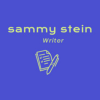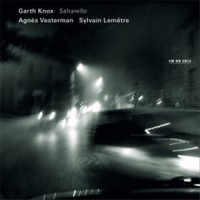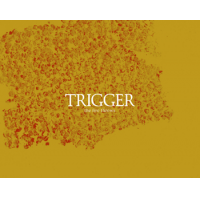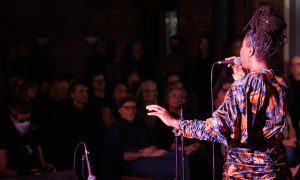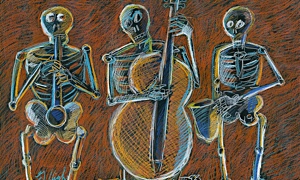Home » Jazz Articles » What is Jazz? » Freeform in the U.K.
Freeform in the U.K.
Many managers supportive of freeform choose the "middle road" option, with a program offering known and predictable attractions who give customers what they expect, interspersed with free players and bands. They may inwardly balk at this compromise, but finances dictate and venues need to survive if they are to be there at all, to carry on offering more left-of-center music.
There are some exceptions. London, in particular, has seen a resurgence in support for freeform gigs, with some venues encouraging wholly experimental evenings. Some freeform players are well-known enough to almost guarantee full houses, whilst others need somewhere to start. It is here where venues like Café Oto and The Vortex have stepped up to the mark, offering customers both worlds. Saxophonists Peter Brötzmann, Mats Gustafsson and Evan Parker are almost regulars, offering customers a journey into freeform and improvised sound, whilst Oto, in particular, intersperses these acts with those just starting out.
Other venues offer free players an arena to get a start. Venues such as Ryan's Bar put on events like FlimFlam. Here, players like saxophonists Alan Wilkinson, wordsmith and drummer Terry Day and violinist Benedict Taylor can play to full houses, but also will not get kicked out if there are only three or four in the audience. The manager has a convivial eye for musicians trying for different sounds and introducing people to new music.
It is worth, for a moment, considering why freeform and improvised music remains on the fringes to many people's thinking and it is something which has to be recognized, if freeform is to continue developing and remain available for both casual and regular customers. To many, the phrase "freeform" is unclear and used to cover such a range of styles that sometimes it is unrecognizable, even to stoic supporters of the genre. The scene changes, with different subgenres developing and becoming accepted within the overall freeform mantle. There remains an association with 1960s political and spiritual beliefs, and many people do not understand how the music has developed away from these origins to some extent, yet still remains the most spiritual jazz genre, uniting a good player's ideas and feelings with those of the listener. It is still changing; such is the nature of improvised music. Once a form of improvisation becomes regularly played, it is no longer true improvisation and sets the scene for more creativity.
Also, it has to be said, some improvised music is hard to listen to. It is not all sublime cosmic bagpipes. Sometimes it is screeching, wailing and the destruction of tunes which many hold dear. Often "tunes" are hard to hold onto, but sometimes also that very destruction and painting of different sounds develops into something so utterly sweet that it whispers to your soul such divine messages, you do not know quite what to do with yourself. Many people go to freeform gigs for just such moments and are willing to experience hours of pain simply to gain that place of absolute bliss. Most freeform players who truly communicate with their audience provide them with something akin to spiritual blessings, once they have tuned into the audience of the moment, but it takes work on both sides and can change in a heartbeat. Other times, it works for ages and you simply tune into each other.Of course, jazz genres other then freeform can be just as creative and spiritual.
What remains true and is part of modern life is that many customers have got so used to music providing what is expected and known that it is difficult to break the conditioning of the "oven-ready meal" mentality, and break away from regulations and musical expectations. While there is a beauty in all genres of music, with freeform, you have to have an open mind and soul—and for some, not knowing what might happen at a gig puts them in a place they find hard to be. They want the music to be in the background while they eat and chat; hard work and interaction is not part of going to a jazz gig, and standards are far easier in this respect than freeform. If you have never taken the chance of going to a gig not knowing what to expect, it can be a difficult prospect. Sometimes the musicians themselves do not make things easy. Listening to even the greats like Brötzmann, Parker, saxophonists Andy Sheppard, Albert Ayler or John Coltrane, or drummer Louis Moholo-Moholo can be hard work at times and you have to actually listen, which takes energy and effort.
Sometimes, even the musicians do not help clarify matters. Davey Payne of The People Band commented in a letter to The Wire Magazine following a People Band article that , ''As far as I am concerned, we weren't out to entertain, and the audience were often confused, pained and drained. We were not trying to whip them into a frenzy or into primal emotions. I believe that at our best, we were creating music on the highest level, knocking on the tenth door,(referring to the door to enlightenment) and that may not necessarily be a good thing, or maybe it is, for some and not for others, including ourselves. After all, who are we to play the divine conch and bagpipes?''
Yet, the rewards for playing or listening to this kind of music are manifold, and some venues remain fiercely protective of promoting the genre. Unless some are willing to take risks, new music is difficult for audiences to access. Without venues of the past like Paradiso, Amsterdam, The Birdland Club in Manhattan, and more modern venues like Ian Storrer's Jazz at the Albert in Bedminster, Bristol, many musicians would not have the opportunity to play and would be lost to audiences.
Europe is becoming difficult, and even Brötzmann comments that gigs are fewer and further between due to the closure of many smaller clubs and the radio stations who promoted new music right up to the 80s or 90s. So, anyone just starting out has a difficult time getting to play. Bigger venues do not want to risk having new people play, and many are at the mercies of corporate management.
London, however—like much of the UK—remains supportive, and many musicians now find the UK one of the best places to play. Across the world there are many places where freeform and improvised music are growing, and musicians venture abroad to bring this music to the rest of us, but it is London and other UK venues which now draw and encourage these musicians, as well as the homegrown ones, and luckily, freeform remains a strong scene in the UK. This is more than readily acknowledged by the musicians I speak to.
The UK is one of the places on earth where people are still willing to take a risk, and its people love the underdog, the slightly out of kilter and the commercially sidelined. If UK people love something, the more authorities try to push it to one side, the stronger the sense of protection, love and care for it will be. It is like this with freeform music. Although the audience remains relatively small, it is steady and growing. It is almost loved more, because it is different (not commercial), and many UK bands have a definite "British" feel to them. The music, of course, leads but the more commercial organizations ignore freeform in the UK at their peril. The more it is ignored, the more fiercely its continuation will be guarded and guaranteed.
Brötzmann himself is a regular at Café Oto and, whereas once he might have played two or three times a year in London, now he plays far more often because it remains one of the best places for his music.
Many players agree that Café Oto has made a real difference. It is often mentioned, in conversation by musicians, not only because the venue offers such a diverse and interesting program of music, musicians and styles, all of which draw crowds, but because it is a larger venue offering diverse music. A consequence has been they have got younger people into the gigs. More women, it has been noticed, attend now and the scene has taken on a vibrancy which was being lost. Clever marketing means they appeal to a wider band of society and the venue is now very much one of the "in" places to be seen. Wilkinson acknowledges that women are increasingly being drawn into Oto gigs—" it is a lot to do with being anonymous. You can be anonymous at Oto, but not at a FlimFlam gig," says Wilkinson.
Venturing into a larger venue where snacks, meals and music are offered together can make the difference between someone getting the chance to ever hear freeform jazz or not. People get introduced to the music who might not otherwise have the opportunity to experience it. If they get a good experience, they are encouraged to seek out smaller, specialty gigs and find out more about the music. They are, in effect, helping to attract a new, different audience to freeform.
Other venues have upped their game, possibly as a consequence of the Oto effect; The Vortex has a much improved program and now provides a wide and intriguing lineup as well as special events.
Venues which always strived to offer different and diverse music have had an unstable few years, but are finding their floors filling up once more. Smaller venues definitely still have a part to play in promoting this music.
Wilkinson says, "It is important not to forget the small musician run, door money gigs like FlimFlam, where we've all been able to encourage and develop the music for many years. I've been running it in the same venue since January 2001. The advantage somewhere like Oto has is that it attracts a more varied and larger audience, which is great for everyone. It's difficult to put that same level of energy and expertise into promoting smaller clubs, and the audience is nearly always the same people. The music can be fantastic or not, but that's the beauty."
Gustafsson agrees that the freeform scene in London is thriving at the moment. London, for Mats, is "the place to play" (he returns to Oto in November alongside Brötzmann and Ken Vandermark). He comments, "It [London] has always been one of the most amazing places for free and creative music, and it always will be. Key players like Derek Bailey, Lol Coxhill, John Stevens, Steve Beresford, Paul Rutherford, Roger Turner and John Butcher all helped build up a totally ass-kicking scene over the years. London became [in the past] one of the most creative scenes in the history of jazz and improvised music. The problem is that venues in London always had very limited funding. But things changed a lot lately with the appearance of Café Oto. It is an amazing place; the people there, the vibe, it is very, very good for the music. There is also the fact you can play for two-to-three days in a row, which is pretty sensational and very good for us, the musicians."
"London," Mats adds, "has always been a hot spot for the music, partly because there has always been a very interesting infusion of musicians coming from other parts of the world like Jamaica in the '60s—Joe Harriott,Keane, and South Africa later on with Louis Moholo-Moholo, Chris McGregor and Dudu Pukwana—and the jazz scene was always strong, so the mix has developed into one which is quite unique."
Vandermark comments on the London scene, "I think the opening of Café Oto has had significant and positive impact on the scene in London. It's caused a healthy competition for The Vortex, which is more or less just down the street, and has doubled the performance opportunities for musicians in England and those visiting from other countries. For a city that has had such profound impact on contemporary music, it has been great to be able to visit London more often in recent years and get to work with players who live in the area: brilliant musicians like John Edwards, Steve Noble, John Russell, John Tilbury and Philipp Wachsmann."
With the smaller European venues losing opportunities to offer freeform musicians new on the scene the chance to play, London seems to have taken over as the main venue in the UK, if not Europe overall. Wilkinson comments, "Oto was much more open when it started, but it's now more difficult for lesser known players to get a gig there. Having said that, I think the growth of places like Oto and The Vortex, which is promoting much more free music, as well as other trendy venues that are popping up, is very healthy and I don't know that there's ever been a time in this country when it's possible to see so many great musicians on a regular basis. Suddenly, London has arrived on the touring scene like never before. Brötzmann, for instance, used to play here maybe once every two or three years; now he seems to be here every other week."
Wilkinson notes, "In order to grow, free music needs places where there is no pressure to fill the place. The restart of Klinker is very welcome, as that has always drawn a very varied audience drawn in by the eclectic mix of its players." Licensing laws and the fact no one works for free in today's environment mean that it is difficult to throw impromptu music gigs, which can stifle freeform expression.
Smaller London venues continue to provide supportive places for new players and that includes Klinker, in Stoke, Newington, which has a regular Tuesday night slot for improvisational music. Its restart has been very welcome, because it has always drawn in a varied audience drawn in by the eclectic mix of its players (according to Wilkinson).
Boat-ting on Temple Pier is held on a boat moored near the Pier and promotes freeform and avant-garde poetry and music, with events every first and third Monday of the month. It only holds 150 people but, since 2002, has been a venue for showcasing fresh talent.
The Luna Lounge, in Leytonstone, also offers freeform music and other genres, and Ryan's Bar has an open mic session on Mondays, where new talent can showcase itself—some are good, some not so but at least it is a venue where anything can happen. Flimflam is a regular feature and where free players like Wilkinson regularly play and The Forge, Camden offers a varied programme.
Hideaway, in Streatham, is a venue which showcases new and rising talent of various genres but includes some freeform players and bands. Pizza Express Jazz Club, on Dean Street, and the 606 Club, SW10, are other smaller venues to hear freeform as well as other genres. Kings Place, York Way, N1, is a London venue where you can catch freeform, amongst a range of art offerings.What is great about these venues is that freefrom is put alongside other genres, offering just as much creativity and interst and it is given equal standing.
Outside London, the venues for freeform are few and far between. The UK has a wealth of talented musicians, but it is hard for them to find places to play where non-mainstream music is welcomed. Many venues reply, when asked, that freeform is something they do not touch, or that evenings where they have invited freeform or improvising musicians to play have been poorly attended. However, things are changing and there is a definite sense of reemergence of interest in London. Support for the music has never really disappeared and some are opening their doors, once more, to larger audiences.
Payne observes that Cornwall is mostly still American country rock and trad jazz by ageing musicians wearing black shirts. This remains true for many regional parts of the UK. 'Jazz' is understood as the easy listening background tosh you get in many restaurants. Yet it remains a fact that visitors paying for a night out still want music they can predict to some extent, whether this is trad jazz or listening to standards like Gershwin played by 'cool dudes' in suits.
It remains true that in many parts of the UK, jazz is relegated to back room "speciality" evenings. "Jazz" is understood as the easy listening background tosh you get in many restaurants. This, of course, deserves an audience but unless it is provided by a good band, it can be banal also and more often than not it is provided by pre-recorded tapes which do nothing to help the music. Yet it remains a fact that visitors paying for a night out still want music they can predict to some extent, whether this is trad jazz or listening to standards like Gershwin played by "cool dudes" in suits. However, due to the uncompromising and defiant support, the London influence is expanding across the UK.
Further from London venues include The Albert, Bristol and Point Blank Theatre, Sheffield—(where "The Noise Upstairs" is a monthly event on Wednesday nights, where freeform and improvised music is showcased). Ipswich has its own festival and, this year, saxophonist Courtney Pine headlines. He also played Snape Festival in 2010. In Manchester, The Band On the Wall offers a mix of music taste including freeform.
Players like Sheppard promote improvised playing to a wider audience, by literally setting up in towns across the UK and Europe. Sheppard's Sax Massive project recently featured in the BT River of Music project in London. In the project, he gathers 200 sax players of different ages and abilities and creates an improvised sound. He has taken this around the UK and into Europe (see the Sax Massive article in the Scumbles column, also at All About Jazz).
Places like Snape Maltings in Suffolk, are more open to introducing the public to freeform music and , in their Snape Proms festival , free players like Sheppard (with Trio Libero) and Staff Bindi Bililli—a Congolese jazz ensemble bringing together manic street music and improvised material—are included alongside more traditional music like orchestra and brass ensembles. Freeform is given equal billing. Some small venues like The Fleece, at Stoke By Nayland, puts on gigs including players like saxophonist Gilad Atzmon and other freeform players, as well as more traditional bands.
Freeform playing is not going away and is growing again in the UK. A Evan Parker comments, "It is an amazingly strong and diverse scene that seems to thrive on adversity. The cultural authorities have been ignoring it for the past twenty years, and hoping it would die of starvation; but they have not reckoned with the determination of people to follow their hearts."
Tags
Fre-Formation
Sammy Stein
United States
Peter Brotzmann
Mats Gustafsson
evan parker
Alan Wilkinson
Terry Day
andy sheppard
Albert Ayler
John Coltrane
Louis Moholo
Davey Payne
Ken Vandermark
Derek Bailey
Lol Coxhill
John Stevens
Steve Beresford
Paul Rutherford
Roger Turner
John Butcher
Joe Harriot
Keane
Louis Moholo-Moholo
Chris McGregor
Pukwana
John Edwards
Steve Noble
John Russell
John Tilbury
Philipp Wachsmann
Courtney Pine
Gilad Atzmon
PREVIOUS / NEXT
Support All About Jazz
 All About Jazz has been a pillar of jazz since 1995, championing it as an art form and, more importantly, supporting the musicians who make it. Our enduring commitment has made "AAJ" one of the most culturally important websites of its kind, read by hundreds of thousands of fans, musicians and industry figures every month.
All About Jazz has been a pillar of jazz since 1995, championing it as an art form and, more importantly, supporting the musicians who make it. Our enduring commitment has made "AAJ" one of the most culturally important websites of its kind, read by hundreds of thousands of fans, musicians and industry figures every month.

